Think AI is just a tech trend? The legal world disagrees.
With 79% of legal professionals now using AI tools like ChatGPT in their daily work, the shift is no longer coming—it’s here. From automating research and contract drafting to streamlining client communications, lawyers who embrace this technology are outperforming peers stuck in traditional workflows.
But ChatGPT isn’t about replacing human judgment. It’s about elevating it. Used wisely, it becomes an extension of your legal mind—handling the grunt work so you can focus on strategy, advocacy, and winning cases.
In this guide, you’ll learn 8 powerful prompting strategies that turn ChatGPT into your smartest, fastest legal assistant.

Why ChatGPT Mastery Isn’t Optional Anymore for Legal Professionals
Picture this: A potential client needs a complex contract reviewed. Your competitor uses ChatGPT to identify key issues in 30 minutes. You’re still on page three after an hour.
Who gets the client? Who gets the referral? And more importantly, who stays relevant in 2025’s legal landscape?
The New Legal Reality Check
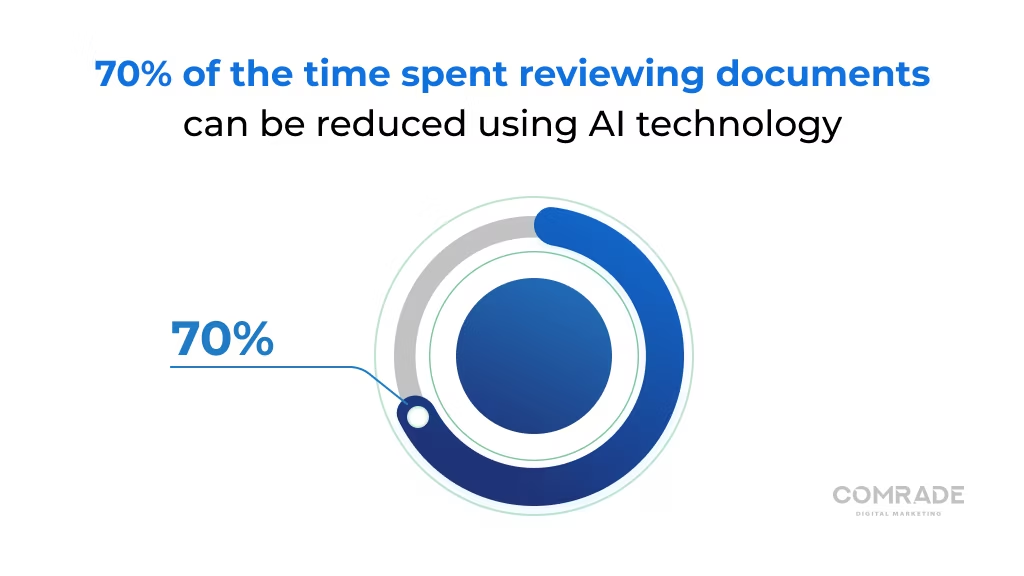
- 68% of in-house counsel say they’re comfortable with their outside lawyers using generative AI tools for their company’s legal work.
- Just 4.5% of lawyers surveyed by the American Bar Association see cost reduction as the biggest benefit AI can bring to law firms.
- According to a study by Accenture, AI technology can cut the time spent reviewing documents by as much as 70%.
If you’re not leveraging these tools, you’re not just working harder — you’re delivering less value at higher costs.
It’s Not About Tech Skills — It’s About Strategic Thinking
ChatGPT doesn’t require coding knowledge or technical expertise. What it demands is something you already have: the ability to think clearly, communicate precisely, and solve complex problems.
The difference between mediocre ChatGPT output and game-changing results? The quality of your prompts. Just like crafting the perfect legal argument, crafting the perfect prompt is an art — and we’re about to teach you how to master it.
The Competitive Edge You Can’t Ignore
Smart prompting helps you:
- Draft documents 10x faster without sacrificing quality
- Uncover legal precedents your opponents might miss
- Generate client communications that get read
- Brainstorm legal strategies from angles you hadn’t considered
Bottom line: While your competitors fumble with generic prompts, you’ll be delivering superior results in a fraction of the time.
8 Strategies for Crafting Effective ChatGPT Prompts with Examples
Crafting effective prompts is key to getting the most out of ChatGPT. Here’s a step-by-step guide to help you create ChatGPT prompts for lawyers that yield the best results.
1. Start with a Clear and Focused Objective
Garbage in, garbage out. That principle applies to legal briefs, and it applies to ChatGPT prompts.
The biggest mistake lawyers make? Throwing vague requests at ChatGPT and expecting magic. “Write a contract” gets you generic nonsense. But “Draft a software licensing agreement for a SaaS startup in California with IP protection clauses” — now you’re cooking with gas.
Transform Vague Requests into Laser-Focused Commands
Clear, detailed prompts lead to faster, more accurate results.
Instead of: “Help me with discovery questions”
Try: “Generate 15 specific interrogatories for a personal injury case involving a rear-end collision where the defendant claims sudden brake failure”
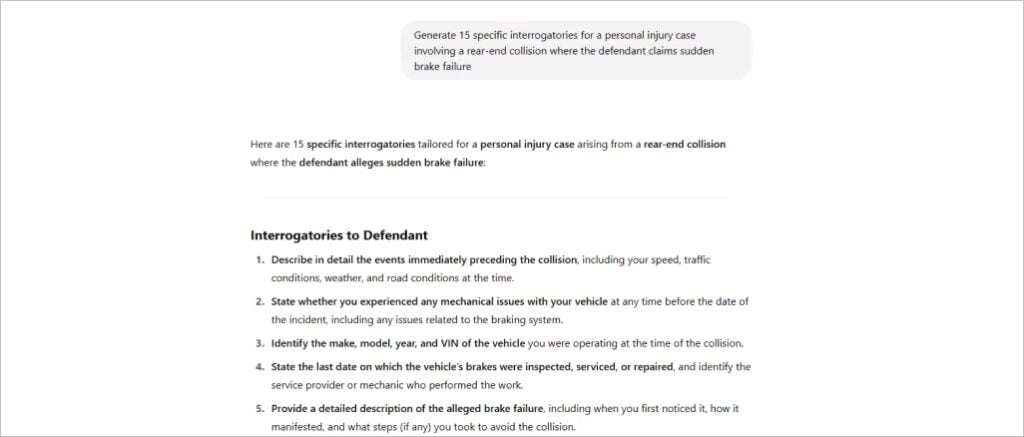
With this focused approach, you’ll get precise, actionable output tailored to your exact needs.
Why Specificity Wins Every Time
ChatGPT processes billions of parameters to generate responses. When you’re specific, you’re essentially giving it a GPS coordinate instead of telling it to “head north.” The result? Output that saves you time instead of creating more work.
The 3-Point Clarity Check
Before hitting enter on any prompt, ask yourself:
- What specific outcome do I need?
- What constraints or requirements apply?
- What format would be most useful?
Master this foundation, and every prompt that follows becomes exponentially more powerful.
2. Provide Strong Context to Guide the Output
Context is everything in the courtroom, and the same goes for using AI tools for lawyers like ChatGPT. Without it, the answers you get are about as accurate as a first-year law student’s wild guess.
Paint the Full Picture
Providing full context ensures your prompt delivers meaningful, relevant answers.
Weak prompt: “What are the tax implications?”
Strong prompt: “What are the tax implications for a California-based LLC with three partners transferring commercial real estate valued at $2.5 million to a Delaware corporation, considering both state and federal regulations?”
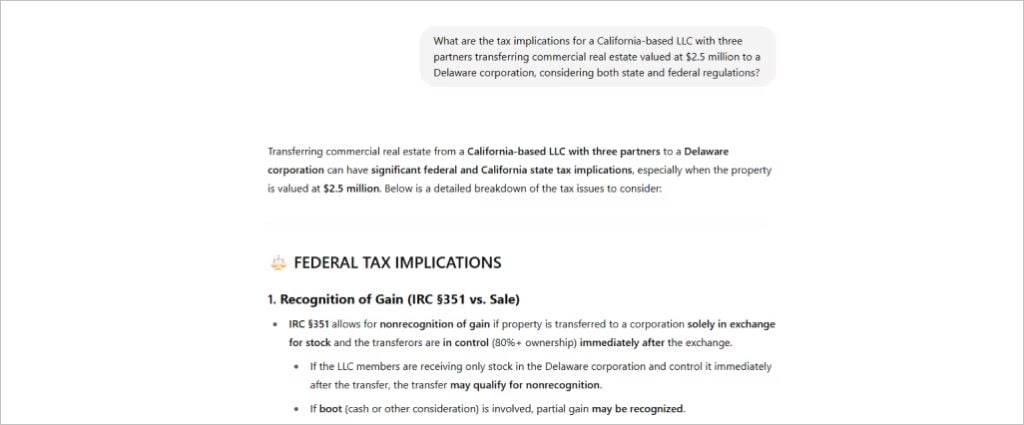
By painting the full picture, you empower better insights and reduce the need for follow-up clarification.
The Context Formula That Works
If you want clear, relevant legal help from ChatGPT, here’s the formula that gets the best results:
- Jurisdiction – Is it a state, federal, or international matter?
- Who’s involved – Briefly explain the key people or entities and how they relate to each other.
- What happened, and when – Lay out the main facts and timeline.
- Legal focus – Mention the specific area of law or statute this involves.
- What you’re hoping for – Are you trying to solve a problem, prevent one, or just understand your options?
When you include these five pieces, you’re giving ChatGPT exactly what it needs to respond like a lawyer who’s already up to speed.
Real-World Context Example
When using ChatGPT, the quality of your input directly shapes the quality of its output. Vague prompts often yield vague answers, but specific, real-world context allows the AI to deliver sharp, relevant, and actionable insights.
Here’s what that looks like in practice:
“My client, a Fortune 500 company, is facing a wrongful termination lawsuit filed by a former executive who alleges age discrimination. The executive is 58, has been with the company for 12 years, and was replaced by someone 35. We’re based in New York. What key defenses should we consider under both federal and New York State employment laws?”
See the difference? This kind of detailed, grounded prompt gives ChatGPT the context it needs to go beyond surface-level advice and provide genuinely useful legal insight.
3. Break Down Complex Requests into Steps
You wouldn’t try to read a 50-page brief in one sitting, right? The same goes for AI for lawyers. Break down complex legal matters into focused, well-structured prompts to get better, smarter results.
The Power of Sequential Prompting
Instead of: “Analyze this merger agreement and tell me all the problems”
Try this sequence:
- “First, identify all representations and warranties in this merger agreement”
- “Now, flag any reps and warranties that seem unusually broad or buyer-unfriendly”
- “Finally, suggest specific language to negotiate better terms for each flagged item”
Why Step-by-Step Beats All-at-Once
Trying to tackle a complicated legal request all at once can lead to missed details and muddled answers. But when you break things down into steps:
- You get more accurate, thoughtful responses
- It’s easier to pivot if something changes
- The AI stays focused on each part
- You prevent information overload and stay within limits
In short, step-by-step keeps your work sharper, clearer, and more manageable—especially when precision matters most.
Complex Task Blueprint
Here’s how to break down any legal task:
- Identify – What needs to be found or recognized?
- Analyze – What patterns or issues emerge?
- Recommend – What actions should follow?
- Draft – What specific language or documents are needed?
This systematic approach transforms ChatGPT from a decent assistant into a legal research powerhouse.
4. Define the Desired Role, Tone, or Perspective
AI marketing for law firms is evolving fast—tools like ChatGPT can mimic voices ranging from seasoned Supreme Court justices to junior associates. The key is giving it clear direction.
Role-Playing for Better Results
Clarity increases when you define the role and audience for your request.
Generic prompt: “Explain this contract clause”
Role-defined prompt: “Acting as an experienced M&A attorney, explain this earnout clause to a junior associate, highlighting potential negotiation points and common pitfalls”
Framing your prompt with a clear perspective leads to more tailored, insightful responses.
Match the Voice to the Audience
Different situations demand different approaches:
- For clients: “Explain in plain English, avoiding legal jargon”
- For opposing counsel: “Use formal, precise legal language”
- For internal strategy: “Be direct and analytical, focusing on risks and opportunities”
- For court filings: “Adopt a persuasive, authoritative tone citing relevant precedents”
The Perspective Shift Advantage
Try these powerful perspective prompts:
- “As a judge reviewing this motion, what weaknesses would you identify?”
- “From opposing counsel’s perspective, what are our three biggest vulnerabilities?”
- “As a skeptical jury member, what questions would you have about this evidence?”
When you define the lens, you get insights that would take hours of mental gymnastics to achieve on your own.
5. Establish Clear Boundaries and Limits
Constraints breed creativity — and in legal work, they ensure compliance. Without boundaries, ChatGPT might draft a masterpiece that’s completely inadmissible or violates ethical guidelines.
Set Your Guardrails
Adding clear boundaries helps guide the response toward your specific goals.
Unfocused: “Write a demand letter”
Focused with limits: “Write a demand letter under 500 words, citing only California state law, avoiding any admission of client fault, with a 30-day response deadline”
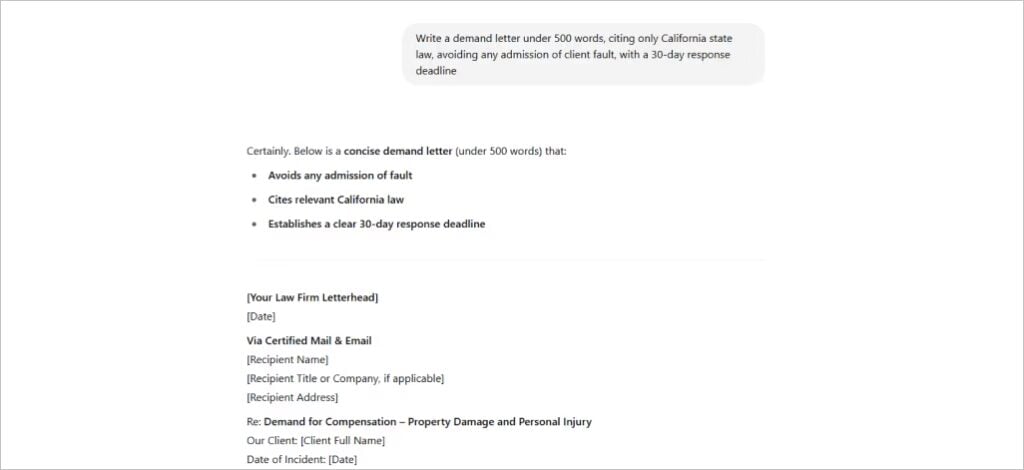
By setting smart guardrails, you ensure the result is both efficient and aligned with your intent.
Critical Boundaries for Legal Work
Always specify:
- Length restrictions (word count, page limits)
- Jurisdictional constraints (state-specific, federal only)
- Ethical boundaries (no guarantees, proper disclaimers)
- Time parameters (statute of limitations, filing deadlines)
- Excluded topics (privileged information, unrelated claims)
The “Do Not Include” List
Sometimes what you exclude is as important as what you include:
- “Do not reference any cases before 2015”
- “Avoid any language that could be construed as legal advice”
- “Exclude any discussion of criminal liability”
- “Do not suggest settlement amounts”
Clear boundaries don’t limit ChatGPT — they focus its considerable power exactly where you need it.
6. Specify the Desired Output Format
Great legal research means nothing if it’s a jumbled mess. Want to stay on top of legal marketing trends? Tell ChatGPT exactly how you want the information—clear, structured, and ready to use.
Format Templates That Save Hours
Having a clear format saves you tons of time and makes everything easier to digest.
- Instead of: “Give me case summaries”
- Try: “Provide case summaries like this: case name and citation, key facts (2-3 sentences), legal issue, court’s holding, and why it matters to our case.”
When you ask for info in a set format, it’s way simpler to read, compare, and use right away.
Match Format to Function
Different tasks demand different structures:
- Client letters: Paragraph format with clear headers
- Legal research: Bulleted findings with citations
- Contract analysis: Table comparing key terms
- Deposition prep: Numbered questions with follow-ups
- Case strategy: Pros/cons lists or decision trees
The Power of Structured Output
Request specific formats like:
- “Create a comparison table with columns for each party’s obligations”
- “List findings in order of legal significance, not chronologically”
- “Format as a legal memorandum with Issues, Brief Answers, Facts, and Analysis sections”
- “Provide as a checklist I can use during client intake”
When ChatGPT knows exactly how to package its insights, you spend less time reformatting and more time winning cases.
7. Offer Examples to Clarify Expectations
Show, don’t just tell. Providing ChatGPT with examples is like giving a new associate a template — it dramatically improves output quality.
The Example Advantage
Examples give your prompt a clear direction and tone to follow.
Weak: “Write a strong opening statement”
Strong: “Write an opening statement similar to this example but for a breach of contract case: ‘Members of the jury, this case is about broken promises. Promises that cost my client not just money, but the American dream itself…'”
With a strong example, you set the bar for quality and style, making it easier to get exactly what you need.
Strategic Example Usage
Examples work best when you:
- Show the style and tone you want matched
- Demonstrate the level of detail expected
- Illustrate the structure to follow
- Highlight specific elements to include
Before-and-After Prompting
One of the most effective ways to get the results you want is by showing clear examples. Try this approach:
“Here’s a weakly written motion introduction: [insert example]. Rewrite it to sound more persuasive, using active voice and a stronger emotional appeal, while keeping a professional tone.”
This kind of prompt gives law ChatGPT a clear direction and helps it understand exactly what you’re aiming for, making your output more relevant, polished, and aligned with your legal standards.
The Template Method
Create reusable sample ChatGPT templates:
- “Format the response like this settlement demand letter I’ve used successfully: [example]”
- “Match the analytical structure of this brief excerpt: [example]”
- “Use similar legal reasoning to this winning motion: [example]”
Examples aren’t crutches — they’re precision tools that ensure ChatGPT delivers exactly what you need, every time.
8. Review, Tweak, and Test for Improvements
The best lawyers don’t win with their first draft, and the best ChatGPT users don’t stop at their first prompt. Iteration is your secret weapon.
The Refinement Process
Great results often come from refining your requests through multiple iterations.
First attempt: “Draft a non-compete clause”
After reviewing output: “Make the geographic scope more specific to a 50-mile radius and add exceptions for pre-existing clients”
Final polish: “Strengthen the consideration language and ensure compliance with [State’s] recent non-compete reform legislation”
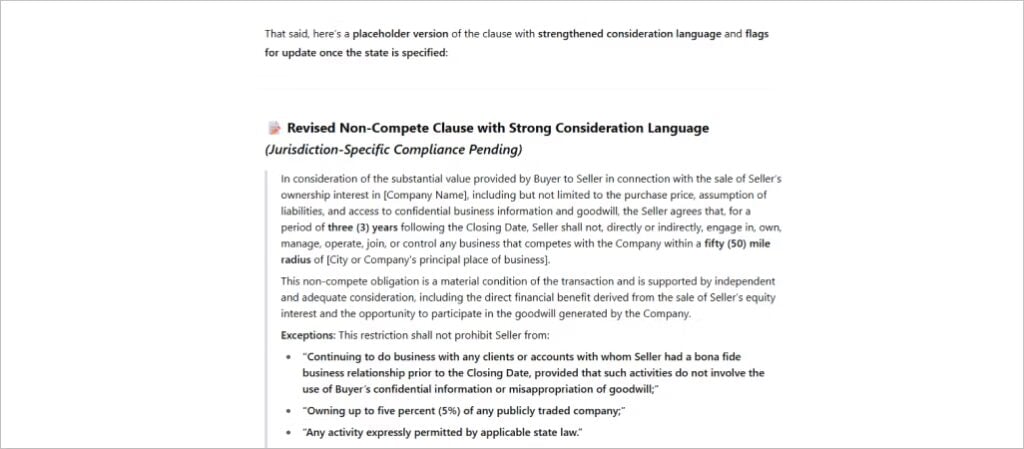
By thoughtfully refining your prompt, you unlock clearer, more precise, and legally sound outcomes.
A/B Testing Your Prompts
Run variations to find what works best:
- Version A: “Explain this tax regulation simply”
- Version B: “As a tax attorney, explain this regulation to a small business owner with examples”
- Version C: “Create a bullet-point summary of this tax regulation’s practical implications for online retailers”
Track which versions produce the most useful outputs for your legal practice.
Building Your Prompt Library
Keep track of your wins by saving the prompts that hit the mark. Notice which phrases work best for each task and turn those into handy templates you can use whenever you need. And remember, sharing your best prompts with the team not only spreads the success but also helps everyone work smarter together. After all, the best ideas grow stronger when they’re shared.
The Continuous Improvement Loop
- Prompt – Start with your best effort
- Review – Assess the output critically
- Refine – Adjust based on what’s missing or wrong
- Repeat – Keep iterating until excellent
- Record – Save the winning formula
Remember: Every refined prompt is an investment in future efficiency. What takes 10 minutes to perfect today saves hours next month.
Transform Your Practice from Reactive to Proactive
ChatGPT offers transformative potential for law firms looking to streamline operations, improve client communication, and enhance legal research. As the legal industry evolves, embracing tools like ChatGPT can give firms a competitive advantage in both efficiency and service.
However, adopting AI successfully requires more than just the right tools—it demands strategic implementation. That’s where expert guidance makes all the difference.
Comrade Digital Marketing Agency helps law firms integrate digital innovations like ChatGPT into their practice with purpose and clarity. We understand your unique challenges and tailor solutions that align with your goals.
Ready to bring smarter systems to your firm? Book a free consultation with Comrade Digital Marketing Agency today and discover how AI can elevate your legal services.
Frequently Asked Questions
-
How might ChatGPT change the future of legal practice and law firm operations?
ChatGPT has the potential to transform the legal profession by streamlining tasks like drafting legal documents and automating routine communications. It can enhance efficiency within law firm operations, allowing attorneys to focus more on strategy and client representation. This shift may also increase access to legal services by reducing costs and time.
-
What ethical issues arise from using AI tools like ChatGPT in law?
The use of AI in the legal field raises serious ethical considerations, especially around accuracy and accountability. One key issue is maintaining client confidentiality when interacting with AI platforms. Lawyers must also ensure the information provided by AI is properly vetted and complies with professional standards.
-
How can ChatGPT help with legal research and case law analysis?
ChatGPT can assist by quickly summarizing key points from statutes, court opinions, and legal commentary. It helps identify relevant case law and interpret how precedents apply to new matters. This support enables attorneys to more efficiently evaluate case outcomes and build stronger arguments.
